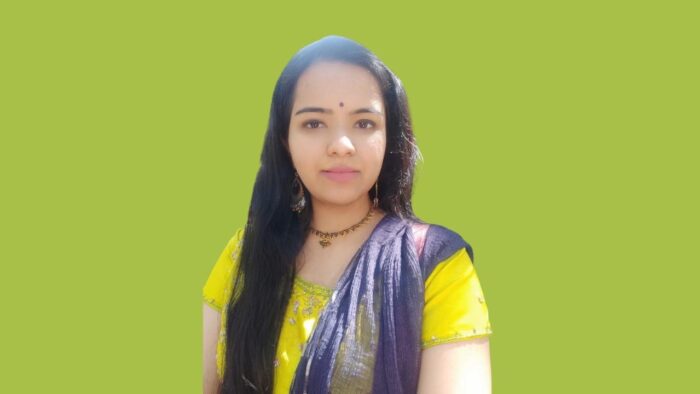Apoorva Raghunandan is a yoga teacher, a singer, a philosopher, a poet, a professor of Electronics, and she manages to perform all of the above as spiritual practices. She was introduced to yoga practice at age seven when her mother, who is also a yoga teacher, gave her lessons at home and that childhood practice was the beginning of Apoorva’s journey to yoga. Her dedication to innocent Indian spiritual practices has given her the inspiration to turn her talent into forms of sadhana so whether she’s singing, writing poetry or dancing, you can be sure it will have depth and spiritual meaning to it. She tells Indica Yoga the story of yoga journey and how it transformed her life and elevated her talent.
Sophia: How did you make the shift from being an engineer to a yoga teacher?
Apoorva: Both of these have always been a part of my life. I’m one of those people who tries to bridge science and philosophy. I would say it was not a shift but more like an inner thirst for knowledge that just bloomed over the years. My mother is a yoga practitioner and a student of Yoga Master Sri H.S Arun ji. She was my first teacher and taught me asanas at the age of seven. As time progressed, I studied Sanskrit during my school days in grades eight, nine and ten, and learnt some of the verses from the Upanishads and the epics. This further kindled my thirst in Vedic knowledge and philosophy. I also studied the Yoga Sutras from my aunt Dr. Latha Satish, who is a student of Sri TKV Desikachar and that gave me exposure to the tradition of Sri. T Krishnamacharya. I was motivated to learn and teach yoga and this is when I pursued a teacher training program from KYM in the year 2020.
Sophia: You love poetry, dancing, and classical music. How does art turn into a form of sadhana?
Apoorva: Music is one of my passions and I’m a trained Carnatic singer. Yes, art turns into a form of sadhana for me. When I sing, I feel it's a form of meditation where I am so into the music that at one point I forget myself. The same goes with poetry too. I feel it's the strong passion or love when we do something we really enjoy. The sadhana is a process of refinement over the years, ensuring that the bliss that I get out of them in a way leads to the same goal of progressing on the spiritual path. So again it is yoga or union here. Union with the things I do. Be it singing a song, or writing a poem.
Sophia: Tell us about your interest and study of Vedic chanting?
Apoorva: Vedic chanting resonates with me more so because of my musical background. Also, it forms the backbone of the Krishnamacharya tradition, where yoga practice is emphasised with the chanting of mantras. I would feel bliss listening to the Vedic mantras chanted by pandits when I attended any homa or other rituals of our traditions.I feel a deep connection with mantras and I was fortunate to learn basic Vedic chanting from my aunt Dr. Latha, and also got to train under Mekhala Desikachar ji for almost two years.
Sophia: How do you combine your varying interests and find the focus to concentrate on all these aspects of spirituality?
Apoorva: Every art form is spiritually connected and has the essence of yoga in it. Involving myself in music or chanting or in yoga practice connects me to my deeper self, a space of bliss and silence.
Sophia: Which mantras do you like to recite that especially resonate with you and why?
Apoorva: Gayatri mantra and surya mantras are my favourite, as they have an energising effect on the body. I’ve always had a special bonding with the sun and love to spend some time in sunlight.
Sophia: Who are some of the Indian spiritual masters that have influenced your work?
Apoorva: Sri TKV Desikachar, Sri Tirumalai Krishnamacharya, Adi Sankaracharya, Sri Ramanujacharya, Sri Raghavendra Swamy, Swami Vivekananda, Sri M. I draw inspiration from them all.
Sophia: Name some of your favourite poets and poems?
Apoorva: William Wordsworth - Tintern Abbey
Robert Frost - The Road Not Taken
Kuvempu - Kaamana Billu
Sophia: Tell us about your youtube channel?
Apoorva: I started it to share my knowledge of yoga, engineering and philosophy.
Sophia: How do you apply Indian philosophy to your daily life?
Apoorva: Yoga and yogic texts like the Bhagavad Gita teach us how to remain calm in the different circumstances of our life. Situations may turn out to be very challenging at times. The key is to accept it and manage whatever we can in the best way it can be managed and whatever is not under our control, we need to surrender that to the almighty. In my daily life, practising yoga and the teachings from our texts in a way keeps reminding me about this. Also, in every action of mine, I am reminded of the aspect of Karma Yoga that is the key message of the Gita, to surrender the fruits of action to the almighty and perform my duty.
Sophia: Any message you’d like to leave us with?
Apoorva: Happy to connect with Indica Yoga. Look forward to collaborating and learning more by involving myself in your work and mission.
To connect with Apoorva, contact her at apoorva.rsi@gmail.com




